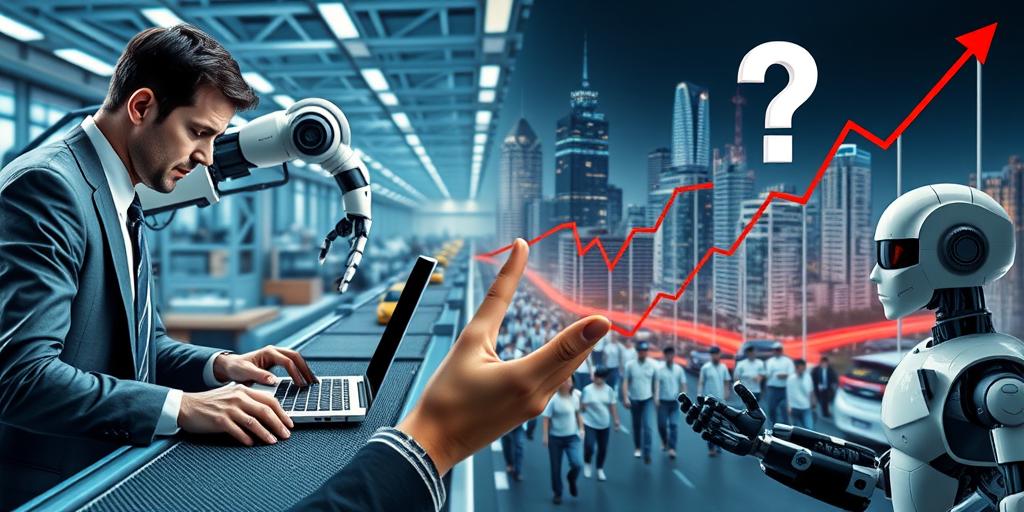The rapid advancements in AI technology have sparked a lively debate – could AI automation take over our jobs? The answer is complex, with both potential for disruption and opportunities for progress. While some jobs may be automated, AI is also creating new roles and transforming existing ones. Understanding the impact of AI automation on the future of work is crucial for individuals, businesses, and society as a whole.
The Rise of Automation: A New Era of Work
AI automation is rapidly transforming industries, from manufacturing to services. Its ability to perform tasks with speed, accuracy, and efficiency is unparalleled.
The Growing Power of AI
AI algorithms can analyze vast datasets, identify patterns, and make predictions. They can automate tasks like data entry, customer service, and even financial analysis. This ability to handle complex tasks is driving the adoption of AI across various sectors.
Automation in Industries: From Manufacturing to Services
In manufacturing, robots powered by AI are already performing repetitive and dangerous tasks, increasing productivity and safety. In the service sector, chatbots powered by AI are handling customer inquiries, providing 24/7 support, and personalizing interactions.
Jobs at Risk: The Automation Dilemma
While AI automation brings benefits, it also raises concerns about job displacement. The potential for automation to replace certain jobs is a real concern.
Routine and Repetitive Tasks: Prime Targets for Automation
Jobs involving routine and repetitive tasks, like data entry, assembly line work, and customer service, are particularly vulnerable to automation. AI algorithms can handle these tasks with greater efficiency and accuracy than humans.
The Impact on Blue-Collar Jobs
Blue-collar jobs in manufacturing, transportation, and logistics are facing significant automation. Robots and AI systems are taking over tasks that were traditionally performed by human workers, leading to job losses in these sectors.
White-Collar Jobs: Not Immune to Automation
Even white-collar jobs, such as legal research, financial analysis, and content creation, are not immune to automation. AI-powered tools can automate these tasks, potentially displacing some professionals.
The Human Advantage: Skills for the Future
While AI automation may displace certain jobs, it also creates opportunities for new roles and requires different skill sets. Humans possess capabilities that AI cannot replicate, making certain skills highly valuable in the future.
Creativity and Innovation: The Unreplaceable Human Touch
AI excels at executing tasks, but it lacks the creativity and ingenuity of human minds. Jobs requiring innovation, problem-solving, and creative thinking are less susceptible to automation.
Critical Thinking and Problem-Solving: Skills AI Can’t Replicate
AI can process data and identify patterns, but it struggles with complex problem-solving requiring critical thinking, judgment, and adaptability. These skills are essential for navigating the complex and dynamic world of work.
Emotional Intelligence and Empathy: The Human Edge
AI may be able to mimic human interaction, but it lacks genuine empathy and emotional intelligence. Jobs that require interpersonal skills, communication, and emotional understanding will continue to be dominated by humans.
Adapting to the Changing Landscape: A New Era of Work
The rise of AI automation requires individuals and businesses to adapt to a changing landscape. Reskilling and upskilling are crucial for staying relevant in the future of work.
Reskilling and Upskilling: Preparing for the Future
Individuals need to invest in acquiring new skills that are in demand in the AI era. This may involve learning new technologies, developing critical thinking abilities, or enhancing communication and collaboration skills.
The Importance of Lifelong Learning
The rapid pace of technological advancements necessitates continuous learning. Individuals need to embrace lifelong learning to stay ahead of the curve and adapt to evolving job demands.
Collaboration Between Humans and AI: A New Paradigm
The future of work is not about humans versus AI. Instead, it’s about collaboration and leveraging the strengths of both. Humans can focus on creative problem-solving and strategic thinking, while AI can handle routine tasks and provide insights.
The Future of Work: A Collaborative Journey
The future of work is uncertain, but it holds immense potential for progress and innovation. By embracing AI responsibly and focusing on human-centric skills, we can create a more equitable and sustainable future of work.
The Potential for AI to Enhance Human Capabilities
AI can augment human capabilities, allowing us to perform tasks more efficiently and effectively. It can provide insights, automate processes, and free up time for more creative and meaningful work.
Creating a More Equitable and Sustainable Future of Work
AI automation has the potential to create a more equitable and sustainable future of work. By automating repetitive and dangerous tasks, it can improve working conditions and create opportunities for new, higher-paying jobs.
The Importance of Ethical Considerations in AI Development
As AI technology continues to evolve, it’s crucial to address ethical considerations. We must ensure that AI is developed and used responsibly, promoting fairness, transparency, and accountability.
The future of work is a collaborative journey, where humans and AI can work together to create a better future. By embracing the opportunities presented by AI automation, we can create a more innovative, productive, and equitable world.




